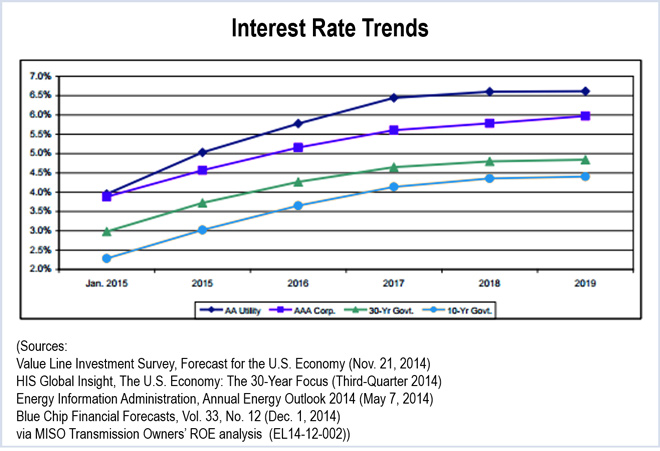By Chris O’Malley
MISO transmission owners have told the Federal Energy Regulatory Commission it should order only a modest reduction in their base return on equity to 11.39%, not the 9.15% sought by industrial customers.
On April 6, the TOs filed an analysis contending 11.39% represented “a logical and supportable estimate of the cost of equity.” Omitting the FERC-approved ROEs for ITC Holdings — the only publicly traded transmission-only company in the U.S. — would result in an “absolute minimum” base ROE of 10.8%, the analysis said.
MISO industrial customers initiated the ROE dispute last fall, contending that transmission operators’ current base return on equity — 12.38%, except for American Transmission Co. at 12.2% — is too high (EL14-12).
The industrials contend the base ROE for TOs should not exceed 9.15%, citing changes in financial markets and other factors. They say the lower base ROE would cut transmission rates by about $327 million annually.
The dispute last year went into settlement discussions, but talks broke down in December.
After it became clear the case would not settle, the MISO Public Consumer Group sector joined in the fight, in what is its first-ever litigation in a FERC rate case.
In February the sector — which includes both non-profit groups and government agencies that represent consumers in utility cases before state regulators — asked MISO for $200,000 to help cover its legal costs in the dispute. (See MISO Advisory Committee Briefs.)
MISO spokesman Andy Schonert said last week that the RTO “continues to consider stakeholder feedback [on the request] and will be finalizing [its] decision quickly.”
On April 3, the consumer advocates asked FERC for approval to amend the group’s intervention by adding the Arkansas Attorney General’s Consumer Utility Rate Advocacy Division; the Kentucky Attorney General’s Office of Rate Intervention; the Louisiana-based Alliance for Affordable Energy; the Montana Consumer Counsel; and the Illinois Attorney General.
“As the outcome of the joint consumer advocates funding request has not yet been determined, it is even more important to broaden consumer advocate engagement in this proceeding in order to build up resources to support the Consumer Advocates’ participation in this case,” wrote Jennifer Easler, an attorney in the Iowa Office of Consumer Advocate.
The dispute follows FERC’s ruling last June that introduced a new, two-step method for calculating transmission owners’ ROEs. Ruling in a case involving New England TOs, FERC tentatively set the “zone of reasonableness” at 7.03 to 11.74%.



